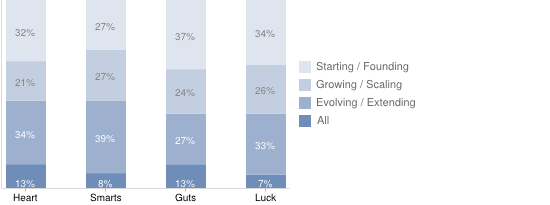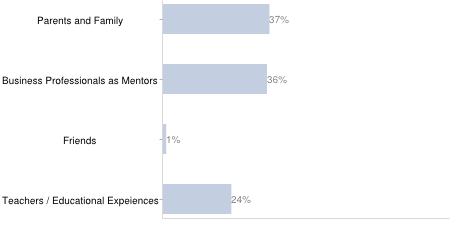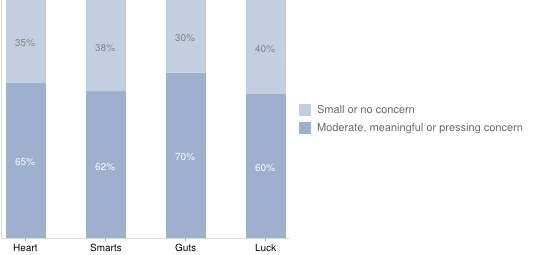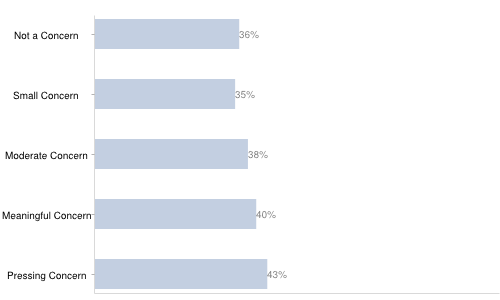Your Entrepreneurial DNA Profile Results: | ||||||||||||
|---|---|---|---|---|---|---|---|---|---|---|---|---|
|
These results are intended to capture your decision making style as an entrepreneur and business builder, with a view towards greater self-awareness. They’re based on our research of what we see as four core “DNA” drivers of what it takes to build a great business: Heart, Smarts, Guts, and Luck. | ||||||||||||
| You are HEART dominant | ||||||||||||

| ||||||||||||
| ||||||||||||
Heart Dominant
Heart dominant individuals are the artists of the business world. You're probably destined to be (or already are) some amalgam of founder, iconoclast, and visionary. You may be stubborn when it comes to your idea, but it is because you already have the three-act narrative bursting inside your head. And it's an authentic narrative with nuance, feeling, and reasons for all of its particularities. You care deeply about what you are doing and can extemporaneously express your vision to anyone who will listen. The driving hunger is to translate that passion into reality and to make a change bigger than just your product. The journey towards achieving your goal is a rewarding experience in and of itself, and you tend to value the intrinsic (e.g. the sense of a meaningful role) as much as the extrinsic (e.g. money). Whether you are starting or you are doing, you are inspired by a deep purpose that drives your decision-making ahead of everything else.
The challenges for you as a Heart dominant individual might come at a critical inflection point of business growth, most commonly when it is time to scale an idea. At this juncture, hard work is sometimes confused with progress and systems and processes can be at odds, and seen as bureaucracy, with a Heart-driven leadership style that is often founder-led (and dependent). In other instances, genuine purpose and passion isn’t enough to make up for deficiencies in organizational structure, one of accountability needed to scale. And perhaps most important to note: sometimes the market realities just aren’t in sync with your passion – at the end of the day, the commercial reality of whether customers want or don’t want what you have needs to be faced. Building a complementary team (and entrusting them with responsibility) and balancing idealism with excellence in scaled-execution are key for the long-term success of the Heart-driven.
Guts Dominant
When the path forward requires decisiveness or bold action, you're the person people turn to. You don't have difficulties making a tough call or sticking to an unpopular decision. You have an ability to 'say it like it is,' to follow a grueling work ethic, and to initiate and persevere through risks when needed.
As a Guts dominant individual you are a starter (you have the Guts to initiate) and have the capacity to endure during challenging times (the Guts to persevere). This 'get things done' attitude complements your stoicism – a trait that people admire in you. Your ability to do this comes in part from your ability to manage and mitigate risks and maintain an even keel while others may be more reactionary as conditions change. Ultimately, the ability to deal with change is one of your great strengths and it is for this reason that you hold the potential to be a good founder, 'pivoter,' or scaler of businesses.
At times, however, Guts dominant people may take on too much risk. Additionally, the propensity to always be moving forward with action, without yet fully embracing Heart-driven values, the bigger picture, or the nuances of a vision are worthwhile to watch out for. An openness to stepping back, especially for longer-term strategic considerations, and being open-minded to complementary modes of thinking by Heart- and Smart-driven individuals help to make a Guts-oriented leader successful.
Smarts Dominant
You have always been bright and intellectually driven, and people describe you as a highly talented individual. While your Smarts may come in the form of book smarts, street smarts, people or creative smarts, the distinguishing factor is that you navigate decisions rationally and analytically, not just from the Heart or Gut. Ultimately you have a better than average capacity and ability to recognize patterns. You tend to consider these patterns of facts, some from past experience, along with others' opinions, before making critical decisions. This is because while you may have deep Heart and passion for an idea, you have enough pragmatism to not get ahead of the external realities around you, like market conditions or technological challenges.
Additionally, some Smarts dominant folks are at another, rarer level of smarts: the true innovator, technical, or creative genius. While not true of most Smart dominant individuals, you may be that special someone who has been able to win patents, invent revolutionary products, or just be orders of magnitude better at thinking about your work. This kind of hyper ability will certainly make your chances of success better than the average Joe.
With that said, and with all those Smarts, there are a couple things you may want to watch out for. Some Smarts-dominant folks can be consumed with finding perfect knowledge before acting, or 'second-guessing' themselves after more information surfaces later The analytical mind also sometimes finds solace in academic approaches and theories, when what really matters is being grounded in the practicality of the market. . Being approximately correct is always preferred over being precisely incorrect. Application of technology always has to trump the brilliance of the technology itself. Finally, intellectually-driven individuals may also unknowingly intimidate others, dismissing some of the softer aspects of business or culture building. Therefore, like other trait-prominent individuals, Smart- prominent people should be self-aware enough to complement their skills, test the practicality of them, and not be afraid to turn up the dial on other aspects of oneself when the business situation calls for it.
Luck Dominant
Some people wonder how you got to be so lucky. Things have just tended to work out for you – whether through a fortuitous relationship, an unexpected opportunity, or sheer happenstance. Whether you have been aware of it or not, you have probably influenced your luck. In our research, it is clear that most Luck dominant individuals are defined by a similar set of core attributes.
Luck is a combination of a Lucky Attitude and a Lucky Network. There are many things that make up this Lucky Attitude, but most important is the trifecta of humility, intellectual curiosity, and optimism. Humility is about awareness of your own limitations; appreciation of the broader efforts of those around you; and a nonjudgmental stance. You likely have enough self-confidence to win the respect of others, but that confidence is counterbalanced with the recognition that there is so much more you don’t know. Intellectual curiosity is an active response to your humility. You have a voracious desire to learn more about just about anything, maybe devouring books, listening to suggestions, or tirelessly exploring new ideas. In the end, thanks to your willingness to meet new people, ask new questions, and go to new places, you have a greater chance of being exposed to and rewarded by Luck.
If humility is the foundation for intellectual curiosity, then optimism gives you the belief, inspiration, and energy to realize new possibilities. You are by nature an optimist. It is a somewhat self-fulfilling prophecy: more Luck tends to come to those people who believe in possibility.
You pair this attitude with a Lucky Network. That is, the slice of your relationship network that seems more serendipitous, less predictable, and more orthogonal than a set of ‘powerful’ networking contacts. Put another way, your relationship network is created less through networking and simply the by-product of you spending time with people you like. Characteristics that define your outlook on relationships include a wiliness to express vulnerability, generosity, authenticity, and openness. Because of this, you have had at times what looks to be the good fortune of knowing people who can help you with your goals – in fact it is likely that you have several “wild card” relationships that will bring about unpredictable but positive impacts to your business endeavors and your life in general.
So, can you have 'too much Luck?' What about 'bad luck?' Our advice is simple. if you don’t have the passion to engage or the smarts to find your way, all that luck may be worthless. And as far as 'bad luck' goes, it’s simply a matter of having a baseline of the 'good luck' factors to be self-aware and ready for the world: read broadly, be curious, and nurture those relationships that will be crucial to your success.
Other Findings:
Our research for the book, combined with ongoing EAT survey data, yields some interesting insights. Here are just a few of the data points coming back:
Preference for Founder/Co-Founder title varies across trait dominance
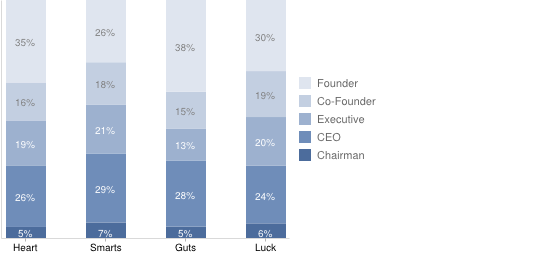
Stated area of most success varies depending on dominant trait
On average, "parents and family" cited as most important influence
Smarts-prominent individuals grew up in markedly different financial situations
Likelihood of exit is higher for entrepreneurs with diffcult financial circumstances as a child
